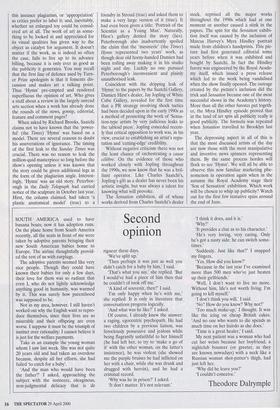Second opinion
SOUTH • AMERICA used to have banana boats; now it has adoption runs. On the plane home from South America recently, all the seats in front of me were taken by adoptive parents bringing their new South American babies home to Europe. The airline thoughtfully provid- ed the rest of us with earplugs.
The adoptive parents seemed like very nice people. Though they could have known their babies for only a few days, their love for them was so radiant that even I, who do not lightly acknowledge anything good in humanity, was warmed by it. This was surely how parenthood was supposed to be.
Not in my area, however. I still haven't worked out why the English want to repro- duce themselves, since their lives are so miserable and their offspring are even worse. I suppose it must be the triumph of instinct over rationality: I cannot believe it is just for the welfare payments.
Take as an example the young woman whom I saw last week. She was not quite 20 years old and had taken an overdose because, despite all her efforts, she had failed `to catch for a baby'.
'And the man who would have been the father?' I asked, approaching the subject with the insincere, oleaginous, non-judgmental delicacy that is de rigueur these days.
'We've split up.'
'Then perhaps it was just as well you didn't catch for a baby by him,' I said.
'That's what you say,' she replied. 'But I would've had a piece of him then that he couldn't of took off me.'
'A kind of souvenir, then?' I said.
'I'm only happy when he's with me,' she replied. It is only in literature that conversations progress logically.
'And what was he like?' I asked.
Of course, I already knew the answer: a raging, egocentric psychopath. He had two children by a previous liaison, was ferociously possessive and jealous while being flagrantly unfaithful to her himself (he had left her, to try to 'make a go of it' with the other woman, on the latter's insistence), he was violent (she showed me the purple bruises he had inflicted on her with a chair, while she was drunk and drugged with heroin), and he had a criminal record.
'Why was he in prison?' I asked.
'It don't matter. It's not relevant.' 'I think it does, and it is.'
'Why?'
'It provides a clue as to his character.'
'He's very loving, very caring. Only he's got a nasty side; he can switch some- times.'
'Suddenly. Just like that?' I snapped my fingers.
'Yes. How did you know?'
'Because in the last year I've examined more than 500 men who've just beaten up their girlfriends.'
'Well, I don't want to live no more. Without him, life's not worth living. I'm going to kill myself.'
'I don't think you will,' I said.
'No? How do you know? Why not?'
'Too much make-up,' I thought. It was like the icing on cheap British cakes. 'And no one who wants to die spends as much time on her hairdo as she does.'
'Time is a great healer,' I said.
My next patient was a woman who had cut her wrists because her boyfriend, a nightclub bouncer (or greeter, as they are known nowadays) with a neck like a Russian woman shot-putter's thigh, had just left her.
'Why did he leave you?'
'I couldn't conceive.'
Theodore Dalrymple


























































 Previous page
Previous page